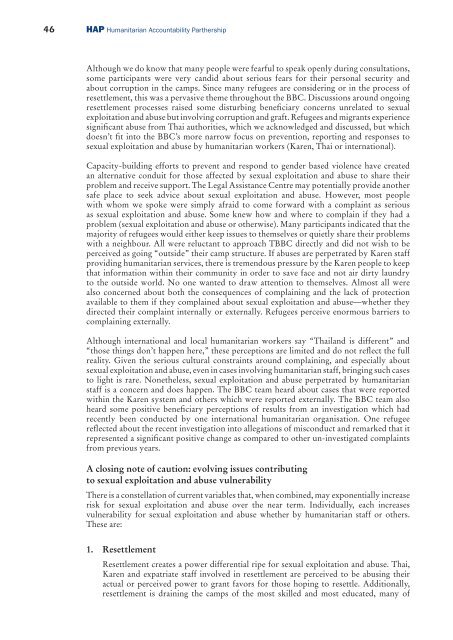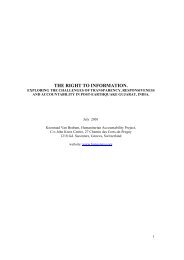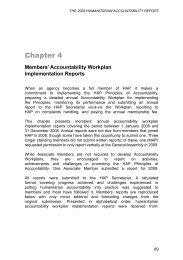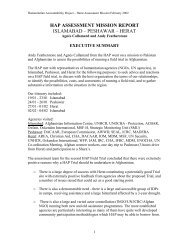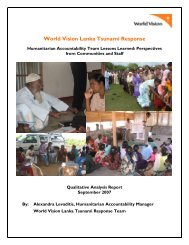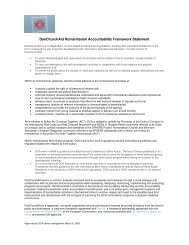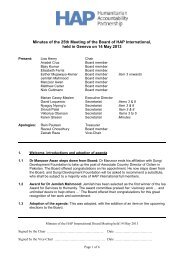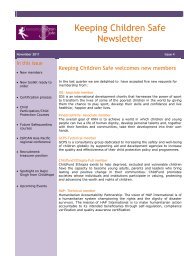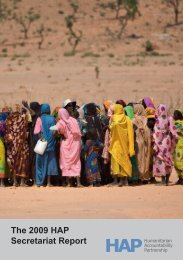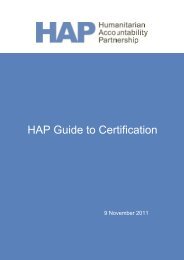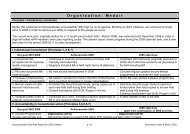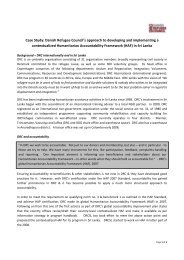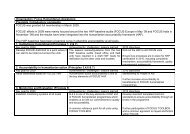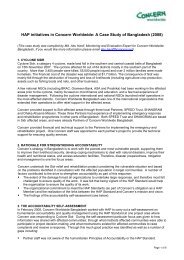TO COMPLAIN OR NOT TO COMPLAIN: STILL THE QUESTION ...
TO COMPLAIN OR NOT TO COMPLAIN: STILL THE QUESTION ...
TO COMPLAIN OR NOT TO COMPLAIN: STILL THE QUESTION ...
Create successful ePaper yourself
Turn your PDF publications into a flip-book with our unique Google optimized e-Paper software.
46 HAP Humanitarian Accountability Parthership<br />
Although we do know that many people were fearful to speak openly during consultations,<br />
some participants were very candid about serious fears for their personal security and<br />
about corruption in the camps. Since many refugees are considering or in the process of<br />
resettlement, this was a pervasive theme throughout the BBC. Discussions around ongoing<br />
resettlement processes raised some disturbing beneficiary concerns unrelated to sexual<br />
exploitation and abuse but involving corruption and graft. Refugees and migrants experience<br />
significant abuse from Thai authorities, which we acknowledged and discussed, but which<br />
doesn’t fit into the BBC’s more narrow focus on prevention, reporting and responses to<br />
sexual exploitation and abuse by humanitarian workers (Karen, Thai or international).<br />
Capacity-building efforts to prevent and respond to gender based violence have created<br />
an alternative conduit for those affected by sexual exploitation and abuse to share their<br />
problem and receive support. The Legal Assistance Centre may potentially provide another<br />
safe place to seek advice about sexual exploitation and abuse. However, most people<br />
with whom we spoke were simply afraid to come forward with a complaint as serious<br />
as sexual exploitation and abuse. Some knew how and where to complain if they had a<br />
problem (sexual exploitation and abuse or otherwise). Many participants indicated that the<br />
majority of refugees would either keep issues to themselves or quietly share their problems<br />
with a neighbour. All were reluctant to approach TBBC directly and did not wish to be<br />
perceived as going “outside” their camp structure. If abuses are perpetrated by Karen staff<br />
providing humanitarian services, there is tremendous pressure by the Karen people to keep<br />
that information within their community in order to save face and not air dirty laundry<br />
to the outside world. No one wanted to draw attention to themselves. Almost all were<br />
also concerned about both the consequences of complaining and the lack of protection<br />
available to them if they complained about sexual exploitation and abuse—whether they<br />
directed their complaint internally or externally. Refugees perceive enormous barriers to<br />
complaining externally.<br />
Although international and local humanitarian workers say “Thailand is different” and<br />
“those things don’t happen here,” these perceptions are limited and do not reflect the full<br />
reality. Given the serious cultural constraints around complaining, and especially about<br />
sexual exploitation and abuse, even in cases involving humanitarian staff, bringing such cases<br />
to light is rare. Nonetheless, sexual exploitation and abuse perpetrated by humanitarian<br />
staff is a concern and does happen. The BBC team heard about cases that were reported<br />
within the Karen system and others which were reported externally. The BBC team also<br />
heard some positive beneficiary perceptions of results from an investigation which had<br />
recently been conducted by one international humanitarian organisation. One refugee<br />
reflected about the recent investigation into allegations of misconduct and remarked that it<br />
represented a significant positive change as compared to other un-investigated complaints<br />
from previous years.<br />
A closing note of caution: evolving issues contributing<br />
to sexual exploitation and abuse vulnerability<br />
There is a constellation of current variables that, when combined, may exponentially increase<br />
risk for sexual exploitation and abuse over the near term. Individually, each increases<br />
vulnerability for sexual exploitation and abuse whether by humanitarian staff or others.<br />
These are:<br />
1. Resettlement<br />
Resettlement creates a power differential ripe for sexual exploitation and abuse. Thai,<br />
Karen and expatriate staff involved in resettlement are perceived to be abusing their<br />
actual or perceived power to grant favors for those hoping to resettle. Additionally,<br />
resettlement is draining the camps of the most skilled and most educated, many of


